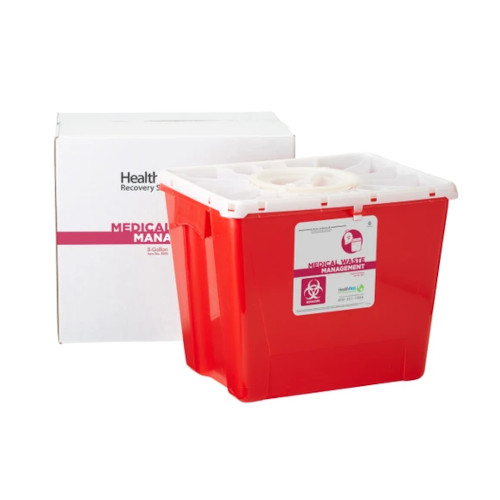Environmental Responsibility: The Eco-Friendly Method to Medical Waste Disposal
Environmental Responsibility: The Eco-Friendly Method to Medical Waste Disposal
Blog Article
Discovering Different Waste Disposal Options for a Cleaner Environment
In the pursuit of a cleaner atmosphere, the management of garbage disposal has actually become a crucial prime focus for lasting development. With a wide range of waste disposal options available, ranging from traditional landfill approaches to cutting-edge waste-to-energy technologies, the choice of how we handle our waste has far-reaching effects for our planet's well-being. By checking out the various strategies and methods used in reusing, composting, incineration, landfill administration, and waste-to-energy processes, a much deeper understanding of their effects and performance can be gained. The quest for optimal garbage disposal methods that prioritize ecological conservation while meeting the needs of a growing population continues to be a pushing issue in today's world.
Recycling Techniques
Implementing effective reusing approaches is important in minimizing waste and promoting sustainability in our atmosphere. Recycling includes the process of transforming waste materials right into recyclable objects to protect against unneeded disposal.
One more essential recycling approach is composting, which includes breaking down natural waste like food scraps and lawn trimmings into nutrient-rich dirt. By including these different recycling methods right into our waste monitoring methods, we can dramatically minimize our ecological footprint and move towards a more sustainable future.

Composting Methods
Reliable waste administration methods, such as reusing approaches, lead the way for a cleaner environment, and currently, shifting the emphasis to 'Composting Techniques', we explore lasting means to disintegrate organic waste for environmental advantage. medical waste removal service.
Composting is an all-natural procedure that changes natural waste, like food scraps and yard trimmings, right into a nutrient-rich soil change. The key to successful composting exists in creating the best equilibrium of environment-friendly materials, such as vegetables and fruit scraps, and brown products, like dried out branches and fallen leaves. These products decay with the assistance of bacteria, breaking down the waste right into valuable garden compost.
Traditional backyard composting includes layering organic products in a container or heap and on a regular basis turning the mixture to freshen it. By making use of composting techniques, we can lower the amount of waste sent to landfills while creating a helpful item for enriching soil and supporting plant growth.
Incineration Benefits And Drawbacks
Incineration, as a waste disposal technique, presents both benefits and negative aspects that merit cautious factor to consider in the world of lasting waste administration methods. On the favorable side, incineration can dramatically lower the volume of waste, decreasing the requirement for land fill space and possibly lowering greenhouse gas emissions.
In addition, the high initial financial investment and functional costs of incineration centers position economic obstacles, making it a much less cost-efficient alternative contrasted to various other waste administration methods. Mindful surveillance and regulation are important to alleviate these unfavorable effects and make best use of the advantages of incineration as component of a thorough waste monitoring technique.
Landfill Administration Approaches
Landfills play a critical role in waste administration and environmental conservation by providing a control system for the disposal of solid waste materials. By condensing the waste, the volume is reduced, permitting for more waste to be fit over time.
Moreover, the application of day-to-day cover techniques is important in lessening smells, protecting against litter, and decreasing the tourist attraction of insects. Treatment the disposed waste at the end of every day aids to contain odors and prevent potential environmental contamination. Furthermore, the tracking of garbage dump gas exhausts and leachate degrees is essential in making certain that ecological standards are met which any prospective threats to surrounding environments are lessened.

Waste-to-Energy Technologies
One of the cutting-edge methods to lose monitoring entails harnessing Waste-to-Energy technologies to convert solid waste into usable energy resources. Waste-to-Energy (WtE) technologies encompass a variety of processes that aim to draw out energy from waste products via thermal, chemical, or organic ways. This conversion procedure not only lowers the volume of waste that winds up in garbage dumps yet likewise produces beneficial energy sources such as electricity, heat, or biofuels.
Incineration entails burning waste at high temperature levels to generate warmth and electrical power. Gasification converts waste into a syngas, which can be made use of for power generation or chemical production.
Executing Waste-to-Energy technologies can help minimize environmental issues related to typical waste disposal methods while all at once providing a renewable resource resource. Careful factor to consider should be offered to discharges control and guaranteeing the sustainability of feedstock supplies for these modern technologies to be genuinely advantageous for a cleaner environment.

Verdict
Finally, discovering different waste disposal alternatives such as recycling, composting, incineration, garbage dump management, and waste-to-energy modern technologies is necessary for promoting a cleaner atmosphere - click here. Each approach has its own advantages and obstacles, yet by utilizing a combination of these techniques, we can function in the direction of reducing the amount of waste that winds up in garbage dumps and inevitably add to an extra lasting future for generations to come
With a wide variety of waste disposal options offered, varying from conventional land fill methods to ingenious waste-to-energy technologies, the option of how we handle our waste has far-ranging ramifications for our earth's health. medical waste disposal.Incineration, as a waste disposal technique, provides both advantages and drawbacks Read Full Report that merit mindful consideration in the realm of sustainable waste monitoring techniques.Garbage dumps play a vital role in waste administration and ecological conservation by offering a control system for the disposal of solid waste products. By condensing the waste, the quantity is reduced, enabling for more waste to be fit over time
One of the innovative strategies to lose management involves utilizing Waste-to-Energy modern technologies to convert strong waste right into useful power sources.
Report this page